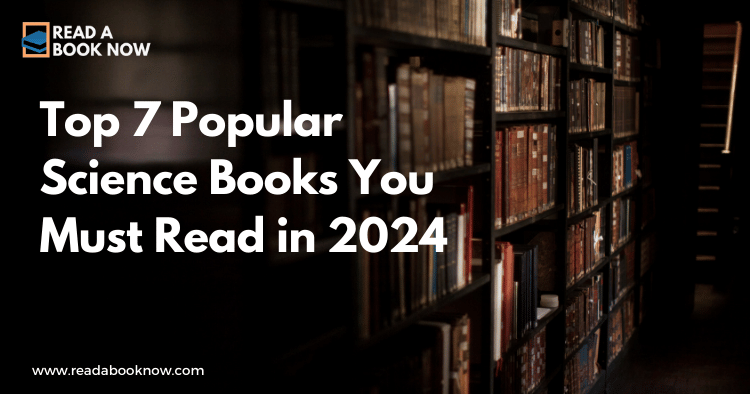Table of Contents
- Introduction
- 1. “The Universe in a Nutshell” by Stephen Hawking
- 2. “The Body: A Guide for Occupants” by Bill Bryson
- 3. “The Gene: An Intimate History” by Siddhartha Mukherjee
- 4. “Astrophysics for People in a Hurry” by Neil deGrasse Tyson
- 5. “The Hidden Life of Trees” by Peter Wohlleben
- 6. “Entanglement: The Interplay of Chaos and Quantum Physics” by Amir D. Aczel
- 7. “How to Avoid a Climate Disaster” by Bill Gates
- Conclusion
- FAQs
Introduction
In a world where scientific advancements shape our daily lives, understanding the principles of science is more important than ever. Whether you’re a science enthusiast or just looking to expand your knowledge, popular science books can bridge the gap between complex theories and everyday understanding. In this article, we present the top seven popular science books you must read in 2024. These selections offer insights into our universe, the human body, climate change, and more.
“Reading science books allows us to grasp the wonders of the universe without needing a PhD.”
1. The Universe in a Nutshell by Stephen Hawking
Stephen Hawking’s “The Universe in a Nutshell” is a masterful exploration of the cosmos. This book serves as a follow-up to his earlier work, “A Brief History of Time,” and delves into modern physics, discussing concepts such as black holes, the nature of time, and the universe’s fate.
Why You Should Read It
Hawking’s ability to distill complicated scientific ideas into engaging narratives makes this book a must-read. With stunning illustrations and diagrams, readers can visualize complex concepts, making it accessible for both novices and seasoned science buffs.
“Understanding our universe can inspire a sense of wonder and curiosity about the world around us.”
Learn more about Stephen Hawking’s legacy here.
2. The Body: A Guide for Occupants by Bill Bryson
Bill Bryson is known for his witty narrative style, and “The Body: A Guide for Occupants” is no exception. In this book, Bryson explores the human body, dissecting its intricate systems and functions.
Why You Should Read It
Bryson’s humor and storytelling ability transform what could be a dry subject into an engaging read. The book covers various topics, including the brain, the immune system, and even the gut microbiome, all while peppering in fascinating anecdotes and facts.
“A greater understanding of our bodies can lead to improved health and wellness choices.”
Discover more about Bill Bryson’s work here.
Siddhartha Mukherjee’s “The Gene: An Intimate History”
Siddhartha Mukherjee’s “The Gene: An Intimate History” takes readers on a journey through the history and science of genetics. Mukherjee combines personal stories with historical narratives to illustrate how genetics shapes our lives and identities.
Why You Should Read It
This book is insightful for anyone interested in the implications of genetic research on health, history, and identity. Mukherjee’s storytelling makes complex genetic concepts understandable, while also addressing ethical considerations in genetic engineering.
“Knowledge of genetics can empower individuals and societies to make informed decisions about health and morality.”
Neil deGrasse Tyson’s “Astrophysics for People in a Hurry”
Neil deGrasse Tyson’s “Astrophysics for People in a Hurry” is a concise introduction to the vast and fascinating field of astrophysics. This book provides readers with the essential concepts and discoveries in the universe without overwhelming them with technical jargon.
Why You Should Read It
Tyson’s engaging prose and accessible explanations make complicated astrophysical concepts digestible. It serves as a perfect primer for those curious about black holes, dark matter, and the Big Bang.
“Astrophysics reveals the wonders of our universe, encouraging curiosity and exploration.”
Amir D. Aczel’s “Entanglement: The Interplay of Chaos and Quantum Physics”
In “Entanglement,” Amir D. Aczel explores the intriguing world of quantum physics and the phenomenon of entanglement. This book serves as an introduction to the bizarre and often counterintuitive principles of quantum mechanics.
Why You Should Read It
Aczel’s ability to simplify intricate theories makes this a compelling read for anyone interested in the cutting-edge of science. By relating quantum principles to real-world applications, he opens the door to understanding the universe at a fundamental level.
“Quantum physics challenges our perceptions of reality and can lead to revolutionary technological advancements.”
7. How to Avoid a Climate Disaster by Bill Gates
In “How to Avoid a Climate Disaster,” Bill Gates outlines a comprehensive approach to tackling climate change. He emphasizes the need for innovation and technology in reducing greenhouse gas emissions.
Why You Should Read It
Gates combines personal insights with data-driven research to present a clear picture of the climate crisis. His actionable steps provide hope and direction for individuals and policymakers alike.
“Every small action can contribute to the larger goal of mitigating climate change.”
Learn more about climate change solutions here.
Also Look For
If you’re interested in exploring more literature that intersects with science, consider checking out some classic literature that delves into scientific themes. Here are some recommendations:
- Top 10 Must-Read 19th Century Classics for Every Book Lover – Many 19th-century classics explore the early understandings of science and human nature.
- 10 Must-Read Victorian Literature Classics You Can’t Miss – Discover how Victorian writers tackled themes of progress, technology, and morality.
- Top 7 Must-Read Feminist Classics That Changed Literature – Dive into works that challenge societal norms and explore identity, which can complement the scientific discussions in contemporary literature.
Conclusion
These seven popular science books offer a treasure trove of knowledge and inspiration for readers in 2024. Whether you’re looking to understand the universe, explore the human body, or confront climate change, these authors provide accessible insights that can spark curiosity and drive change. Dive into these reads and equip yourself with the knowledge to navigate the fascinating world of science.
“Knowledge is power, and these books are a gateway to understanding the world.”
FAQs
What are “popular science” books?
Popular science books present scientific concepts and discoveries in a way that is accessible and engaging to general readers, often using storytelling techniques.
How do I choose a popular science book?
Consider your interests—whether it’s space, biology, or environmental science—and look for books that have received positive reviews or are written by reputable authors in the field.
Are these books suitable for beginners?
Absolutely! Each of these books is designed to be approachable for readers without a scientific background, making them perfect for beginners.
Can I find these books in libraries?
Most of these titles are widely available in public libraries and bookstores, both online and offline.




